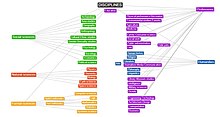List of academic fields: Difference between revisions
←Created page with '{{main|Discipline (academia)}} thumb|Mind map of top level disciplines and professions The following outline...' |
→Earth sciences: petrology |
||
| Line 950: | Line 950: | ||
** [[Paleobiology]] |
** [[Paleobiology]] |
||
** [[Paleoecology]] |
** [[Paleoecology]] |
||
* [[Petrology]] |
|||
* [[Planetary science]] (alternatively, a part of [[space science]]) |
* [[Planetary science]] (alternatively, a part of [[space science]]) |
||
* [[Sedimentology]] |
* [[Sedimentology]] |
||
Revision as of 23:13, 8 June 2017

The following outline is provided as an overview of and topical guide to academic disciplines:
An academic discipline or field of study is a branch of knowledge that is taught and researched as part of higher education. A scholar's discipline is commonly defined and recognized by the university faculties and learned societies to which he or she belongs and the academic journals in which he or she publishes research. However, no formal criteria exist for defining an academic discipline.
Disciplines vary between well-established ones that exist in almost all universities and have well-defined rosters of journals and conferences and nascent ones supported by only a few universities and publications. A discipline may have branches, and these are often called sub-disciplines.
There is no consensus on how some academic disciplines should be classified (e.g., whether anthropology and linguistics are disciplines of social sciences or fields within the humanities). More generally, the proper criteria for organizing knowledge into disciplines are also open to debate.
Historical background
History of academic disciplines – academic disciplines arose from learning institutions as those grew to include specialized faculties or departments
Humanities
Anthropology
|
|
Archaeology
- Classical archaeology
- Egyptology
- Architectural analytics
- Experimental archaeology
- Maritime archaeology
- Near Eastern archaeology
- Paleoanthropology
- Prehistoric archaeology
History
Linguistics and languages
Philosophy
Religion
|
The arts
Literature
- Poetry
- Comparative literature
- English literature
- World literature
- History of literature
- Literary theory
- Creative writing
- Creative nonfiction
- Fiction writing (outline)
- Non-fiction writing
- Literary journalism
- Poetry composition
- Screenwriting
- Playwrighting
Performing arts
|
|
Visual arts
Social sciences
Economics
Geography
|
|
Interdisciplinary studies
Area studies
- African studies
- American studies
- Asian studies
- Central Asian studies
- East Asian studies
- Indology (Indian studies)
- Iranian studies
- Japanology (Japanese studies)
- Korean studies
- Pakistan studies
- Sindhology
- Sinology (outline) (Chinese studies)
- Southeast Asian studies
- European studies
- Australian studies
- Middle East studies
- Russian and Eastern European studies
Ethnic and cultural studies
- Cultural studies
- Ethnic studies
- Ethnology
- Culturology
- Cross-cultural studies
- White studies
- Black studies
Gender and sexuality studies
|
|
Organizational studies
- Business economics
- Business ethics
- Decision science
- Entrepreneurship
- Human resources management
- Industrial organization
- Organizational behavior
- Organization theory
- Strategy
Political science
Psychology
Sociology
Natural sciences
Biology
Chemistry
- See also Branches of chemistry
Earth sciences
- See also Branches of earth sciences
|
Physics
Space sciences
|
Formal sciences
Computer sciences
Also a branch of electrical engineering
Logic
Mathematics
Pure mathematics
- See also Branches of mathematics and AMS Mathematics Subject Classification
|
|
Applied mathematics
|
Statistics
Systems science
Professions and applied sciences
Agriculture
|
Architecture and design
|
|
Business
Divinity
|
|
Education
Engineering and technology
Environmental studies and forestry
Family and consumer science
Human physical performance and recreation
|
|
Journalism, media studies and communication
Law
|
|
Library and museum studies
|
|
Medicine
Military sciences
|
Public administration
- Corrections
- Conservation biology
- Criminal justice (outline)
- Emergency management
- Fire safety (Structural fire protection)
- Fire ecology (Wildland fire management)
- Governmental affairs
- International affairs
- Peace and conflict studies
- Police science
- Policy studies
- Public administration
Public policy
- Agricultural policy
- Commercial policy
- Cultural policy
- Domestic policy
- Drug policy
- Economic policy
- Education policy
- Energy policy
- Environmental policy
- Food policy
- Foreign policy
- Health policy
- Housing policy
- Immigration policy
- Knowledge policy
- Language policy
- Military policy
- Science policy
- Social policy
- Public policy by country
Social work
- Child welfare
- Community practice
- Human Services
- Corrections
- Gerontology
- Medical social work
- Mental health
- School social work
Transportation
- Highway safety
- Infographics
- Intermodal transportation studies
- Marine transportation
- Operations research
- Mass transit
See also
- Academia (outline)
- Academic genealogy
- Curriculum
- Interdisciplinarity
- Transdisciplinarity
- Classification of Instructional Programs
- Joint Academic Coding System
- List of fields of doctoral studies in the United States
Notes
References
- Abbott, Andrew (2001). Chaos of Disciplines. University of Chicago Press. ISBN 978-0-226-00101-2.
- Oleson, Alexandra; Voss, John (1979). The Organization of knowledge in modern America, 1860-1920. ISBN 0-8018-2108-8.
- US Department of Education Institute of Education Sciences. Classification of Instructional Programs (CIP). National Center for Education Statistics.
External links
- Classification of Instructional Programs (CIP 2000): Developed by the U.S. Department of Education's National Center for Education Statistics to provide a taxonomic scheme that will support the accurate tracking, assessment, and reporting of fields of study and program completions activity.
- Complete JACS (Joint Academic Classification of Subjects) from Higher Education Statistics Agency (HESA) in the United Kingdom
- Australian and New Zealand Standard Research Classification (ANZSRC 2008) (web-page) Chapter 3 and Appendix 1: Fields of research classification.
- Fields of Knowledge, a zoomable map allowing the academic disciplines and sub-disciplines in this article be visualised.
- Online reference materials for any kind of specific academic disciplines [where?].
